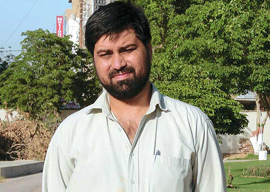
July 11, 2011

Syed Saleem Shahzad
When I received Pluto’s email, I forwarded it to friends and organizations that espouse the cause of our colleagues in trouble: the Committee to Protect Journalists, Reporters Without Borders, and London’s Frontline Club. I expected a campaign of petitions to the Pakistani government demanding his immediate release, as well as appeals from Hillary Clinton and others on his behalf.
Unfortunately, it was too late.
Another email from Pluto arrived later that day stating he’d been found dead in Pakistan:
Further to this morning’s email. It is my sad duty to announce that Pluto author and international journalist Syed Saleem Shahzad, author of Inside Al-Qaeda: Beyond bin Laden and 9/11, has been found dead in suspicious circumstances, two days after he went missing and three days after writing an article on possible complicity between Al Qaeda and elements of the Pakistani Navy.
They found his badly tortured corpse beside a canal about eighty miles from Islamabad. Rather than allow a pathologist to conduct an autopsy, the police arranged for a speedy burial. (Shahzad’s body was later exhumed for a post-mortem examination.) Press clubs in Pakistan’s larger cities have staged protests against the government over their colleague’s murder. Journalist and author Mohammed Hanif asked on Twitter: “Any journalist here who doesn’t believe that it’s our intelligence agencies?” So far, the answer has been no.
The Committee to Protect Journalists reported that more journalists have been killed in Pakistan in the last year than in any other country. Spokesman Bob Dietz said that in Pakistan, “people who kill journalists are not brought to justice.” It may take internal and international pressure to change that, and anger in Washington may help.
Reports quickly indicated that the White House and State Department were not buying the ISI’s denials of involvement in his murder. Admiral Mike Mullen, chairman of the Joint Chiefs, said he believed Pakistan’s government had “sanctioned” Shahzad’s murder.
Buy Shahzad’s book, not only to help support the wife and three children whom he leaves behind, but also to learn. It tells us what the Pakistani government, whose corruption and brutality Shahzad died to expose, does not want us to know. Finding out is the least we can do.